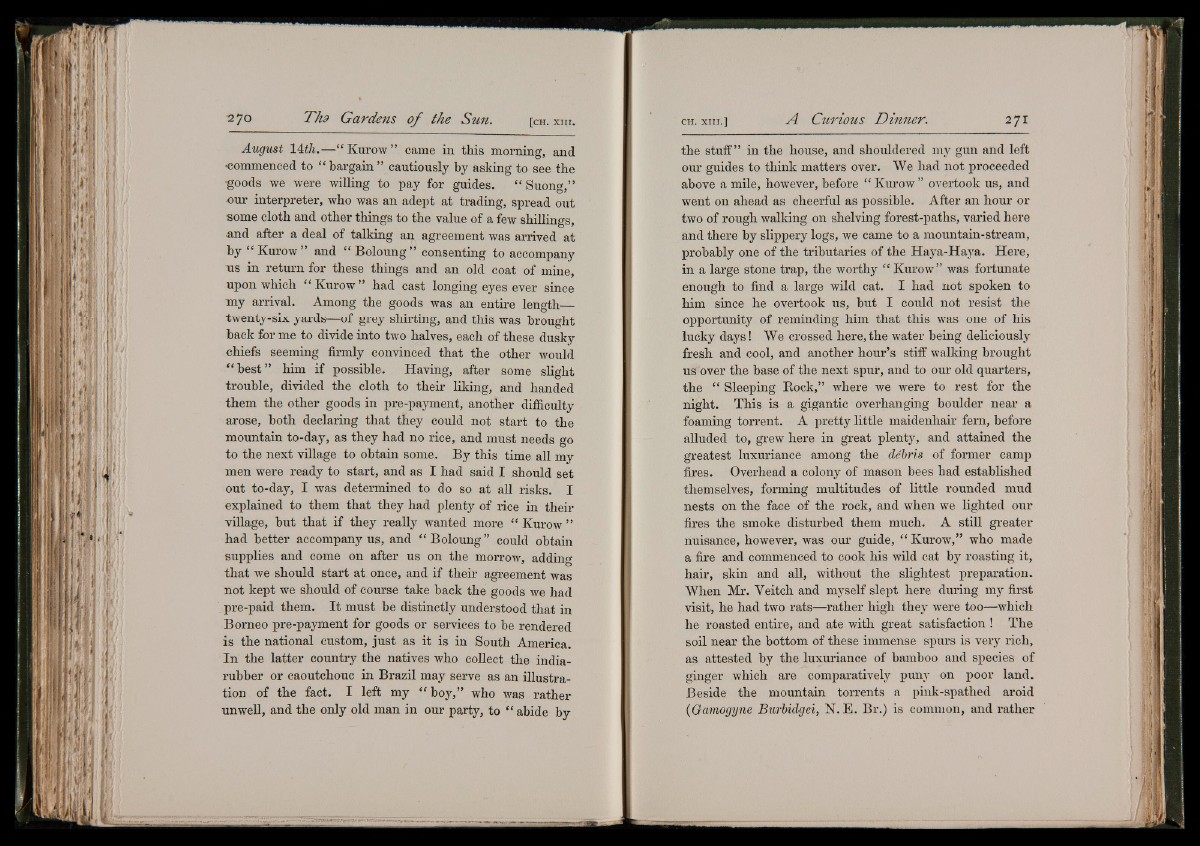
August 14th.—“ Kurow” came in this morning, and
•commenced to “ bargain ” cautiously by asking to see the
•goods we were willing to pay for guides. “ Suong,”
our interpreter, who was an adept at trading, spread out
some cloth and other things to the value of a few shillings,
•and after a deal of talking an agreement was arrived at
by “ Kurow ” and “ Boloung ” consenting to accompany
us in return for these things and an old coat of mine,
upon which “ Kurow ” had cast longing eyes ever since
my arrival. Among the goods was an entire length—
twenty-six yards—of grey shirting, and this was brought
back for me to divide into two halves, each of these dusky
chiefs seeming firmly convinced that the other would
“ best” him if possible. Having, after some slight
trouble, divided the cloth to their liking, and handed
them the other goods in pre-payment, another difficulty
arose, both declaring that they could not start to the
mountain to-day, as they had no rice, and must needs go
to the next village to obtain some. By this time all my
men were ready to start, and as I had said I should set
out to-day, I was determined to do so at all risks. I
explained to them that they had plenty of rice in their
village, but that if they really wanted more “ Kurow ”
had better accompany us, and “ Boloung” could obtain
supplies and come on after us on the morrow, adding
that we should start at once, and if them agreement was
not kept we should of course take back the goods we had
pre-paid them. It must be distinctly understood that in
Borneo pre-payment for goods or services to be rendered
is the national custom, just as it is in South America.
In the latter country the natives who collect the india-
rubber or caoutchouc in Brazil may serve as an illustration
of the fact. I left my “ boy,” who was rather
unwell, and the only old man in our party, to “ abide by
the stuff” in the house, and shouldered my gun and left
our guides to think matters over. We had not proceeded
above a mile, however, before “ Kurow ” overtook us, and
went on ahead as cheerful as possible. After an hour or
two of rough walking on shelving forest-paths, varied here
and there by slippery logs, we came to a mountain-stream,
probably one of the tributaries of the Haya-Haya. Here,
in a large stone trap, the worthy “ Kurow” was fortunate
enough to find a large wild cat. I had not spoken to
him since he overtook us, but I could not resist the
opportunity of reminding him that this was one of his
lucky days! We crossed here,the water being deliciously
fresh and cool, and another hour’s stiff walking brought
us over the base of the next spur, and to our old quarters,
the “ Sleeping Bock,” where we were to rest for the
night. This is a gigantic overhanging boulder near a
foaming torrent. A pretty little maidenhair fern, before
alluded to, grew here in great plenty, and attained the
greatest luxuriance among the debris of former camp
fires. Overhead a colony of mason bees had established
themselves, forming multitudes of little rounded mud
nests on the face of the rock, and when we lighted our
fires the smoke disturbed them much. A still greater
nuisance, however, was our guide, “ Kurow,” who made
a fire and commenced to cook his wild cat by roasting it,
hair, skin and all, without the slightest preparation.
When Mr. Yeitch and myself slept here during my first
visit, he had two rats—rather high they were too—which
he roasted entire, and ate with great satisfaction ! The
soil near the bottom of these immense spurs is very rich,
as attested by the luxuriance of bamboo and species of
ginger which are comparatively puny on poor land.
Beside the mountain torrents a pink-spathed aroid
(Gamogyne Burbidgei, N. E. Br.) is common, and rather